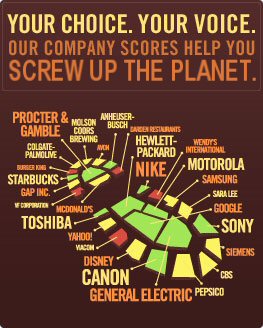
Greenwashers don’t want to be exposed; exposure is dangerous because they no longer control the message, and if they cannot control the message then they cannot control what people think and do. My job, as the author of The Unsuitablog is to wrest control of the message from the greenwashers, and free us from the lies that are relentlessly paraded before us. In the light of truth, we are free to make our own minds up, rather than being made to see these purveyors of harm in the way they would like us to see them.
I want you to be able to do this as well: not only recognising the hypocrisy and the greenwash*, but taking part in exposing the liars for yourself. It’s not always easy, but with a bit of help we can really take them on.
Critical to the act of Exposure, however you do it, is Investigation. Without investigation you have little or nothing to back up any claims you make, nor will you be sure of the accuracy of the information you present. Investigation is also critical because it can often lead to the discovery of far worse things than you may have initially expected, giving your effort far more justification, and potentially preventing extremely destructive activities. Feel free to — like I sometimes do — have a cheap shot at your Target, but if you want to do something really worthwhile, you need to investigate.
The Target
You can take two approaches to deciding on your target: there is the ad hoc approach, which involves identifying greenwash as it happens, regardless of the source, in order to pick off the most vulnerable targets; there is also the targeted approach, based on a set number of targets that most interest you — this may be because you have a personal grudge against a company, politician etc., are interested in a particular area of study, or because the target is simply very worthwhile — such as a major polluter.
Once you have identified your Target, you need to check that they are greenwashing. Your instincts are very valuable, as is the nature of the Target, in telling you quickly what is up. However, if you are going to investigate further, you need to be pretty sure that the Target is, indeed, greenwashing — using this guide will be of great help in most cases.
Before you embark on the investigation, you should also have some understanding of the nature of the Target’s operations: if it is a company, public body, charity, religion or other organisation, you need to know how they operate both within their “marketplace” and internally; if an individual, then you need to know a bit about their history and their personal life. Having prior experience in the area in which they operate is extremely valuable, and will always give you a head start.
Casing The Joint
Investigating greenwash is akin to carrying out a crime, in that you are trying to do something that runs counter to the desires of the Target. Anyone with experience of carrying out nefarious activities (whether strictly legal or not) will already have a fair grounding in the activity known as “scoping” (i.e. the research process), but if you have experience in preventing such activities (e.g. as a PR professional, or a security expert) this can be equally valuable, and in some cases moreso. Even if you don’t have personal experience, though, it doesn’t rule out doing the dirty on the greenwasher: someone with sufficient nous and a set of tools (see later) will be able to get along fine, and with practice become highly adept.
The dictum “know your enemy” provides an excellent guiding principle here, and underlines the first rule of investigation, namely that you should never go into the role unprepared.
Scoping can be a long and highly drawn out process, and the level of research you carry out depends on many factors:
– How risky the exposure is likely to be to you
– How much prior experience you have
– What level of damage you wish to inflict on the Target
– How difficult the Target is likely to be to penetrate / expose
– How much time you have
I cannot tell you how much research to do and precisely what to look for — remember, it’s your investigation — but the more you do, the better your chances of success. However, if you need to get something out into the open very quickly, then you may be restricted in how much you can do, in which case try and minimise the risk to yourself.
(For more information about risk levels, read the section on Sabotaging in A Matter Of Scale.)
The Internet is your friend in the scoping process: not only can it provide you with official information about the organisation or person you are targeting, it can also give details about the best people to contact, lots of background information from third party sources (Sourcewatch being a particular favourite of mine) and may even be able to put you in touch with other people trying to achieve the same aims. Beware, though: this kind of work is often best carried out alone, and you should only reveal your true aims to people you implicitly trust.
Spend time on the Target’s website, if there is one, to get a good feel for the way it presents itself publically — this is very important for The Sting, as you will see — and, in the case of a large company or public body don’t be afraid to call up their helpdesk or customer service team just to make innocent enquiries. One very useful exercise is “follow the links” which I describe in some detail in this article — it is surprising where a bit of lateral thinking can get you.
Make plenty of notes on paper (ensuring you shred everything afterwards), along with asking rhetorical questions along the way (e.g. will I really get the information I need from that person?) to ensure you are gathering the information you need and have enough of it. Once you are confident you have enough information to allow you to ask the right questions and/or to access whichever aspects of the Target you need to, then you are ready for The Sting.
The Sting
The Sting is the process by which you verify your suspicions and, in some cases, uncover things far worse. It is entirely possible to expose greenwash without carrying out this process — by doing so you minimise personal risk — and much of the exposure on The Unsuitablog is of this nature. Scoping information is also very useful for others who wish to go further, so on its own can be very useful. However, if you want to really rock the boat you are likely to have to get information right from the horse’s mouth.
You already know who you need to speak to, what to ask, and approximately how to probe further if the opportunity presents itself, and I am assuming that most of this communication is going to be carried out by telephone and, possibly, by e-mail. You may be using other methods, but I am not going to discuss, for instance, entering premises, hacking or interception, largely because I am not in a position to take responsibility for any repercussions. The information about Sabotaging, linked to earlier,, will help if you wish to do such things.
To carry out The Sting you need, as I have said, to have done your homework; but you also need two more key things: Tools and Techniques. These are not only beneficial, but without some of them it may be impossible to get the information you need at all, and you may also put yourself at far more risk than is necessary. The second key rule of investigation is to avoid getting caught.
Tools
If you wish to present information formally, or use it for reference later, you will need to record this information. All large organisations, as a matter of course, record incoming telephone calls and do not have to state that this recording is taking place if it is for the purpose of crime prevention: as you are investigating environmental crimes, albeit not crimes as the system would necessarily judge them, you are morally justified in doing the same. If you use internet phone software then any audio capture tool will record the conversation, but remember that you will need to mask your identification (see later). For recording telephone calls, either land or cell phone, then there are a number of devices on the market, including this Sony microphone, which can be recorded to a tool like Audacity.
If using email, make sure you keep anything sent by the Target in its original format — if you convert or copy emails, you potentially lose valuable tracking information.
Because you are communicating in a two-way manner, you must always conceal your identity to avoid comebacks. By telephone this can be carried out either by using a known privacy prefix (in the UK it is 141, check with your provider for the code) or going through the main switchboard of the organisation you are calling — switchboard transfers almost always mask the caller’s number.
Obviously you should use a pseudonym during this stage, not forgetting at any point that you are operating under an assumed name! It is best to keep the same pseudonym for a while, so you get used to being referred to by that name.
When using email, never use your primary email address or give it out, unless you are doing low risk work (you need to decide if it is worth the risk): create one or more pretend accounts, either by owning your own domain, so you can create any prefix you like, e.g. fred.smith@mydomain.com, or using Hotmail or Yahoo! Don’t forget that if you are using your normal mail client, your return address may expose your identity!
If you are using public internet or telephone access, remember that your history or call information (and even the call itself) may be stored centrally. Never go beyond the scoping process if you are at work, unless you are prepared to lose your job!
Techniques
These techniques are primarily for the purpose of getting the Target to give away more than they would like to, so it goes without saying that more experience you have, the more likely you are to extract the proverbial “golden egg”. That said, there is no reason you won’t get lucky first time. Be aware, though, some of these techniques are risky, and may damage your chance of following up should you wish to.
As I said, you need to cover your tracks, so apart from the technical means, you also need to make sure that you are in control of the communication: this means using such tactics as asking for names and numbers in order to call back later; only offering your contact details (fake ones) as a last resort and having a cache of useful excuses for conducting the conversation on your terms (“I’m using someone else’s phone” or “I don’t know where I’ll be in an hour”).
Remember when I mentioned knowing about the Target’s public presentation? One important aspect of this is knowing what their audience is: for instance, if a suspect advertisement was placed in a professional journal, then you will be best playing the part of the type of professional in question — this can be very tricky; if you see a suspect product in a supermarket, then pretend you are a customer. What this does is make the recipient of the call comfortable, so that you can ask leading questions without them becoming too supicious (remember, you are recording this). If you can really act stupid then hit the Target with a killer question they may be caught unawares and give too much away.
Another useful technique is “hitting below the belt”: basically this involves talking to employees or representatives at the lowest possible level. It is sometimes said that the people who know most about an organisation are the people who work in the post room, so why not get friendly with them (just ask to speak to the Post Room from the switchboard)? You may be lucky and find a disgruntled employee who wants to dish the dirt. There is little point in going to the top: directors and senior managers are usually trained in dealing with the media, so rarely give much away; their assistants, on the other hand, could be useful.
One final technique that sometimes yields stunning results, is using the CC function on email. This has limited applications but, say for instance you send an email (from your fake mailbox) to a senior person, while CC-ing a number of other senior people in an organisation: their training will mean that they are liable to contact each other to ensure that everyone stays “on message”. If your CC list is long enough then you can bury your own address in the middle of the list, so when they click “Reply All”, you also become the recipient of that sensitive email!
In the final article of this series I will describe different ways of Exposing greenwashers, but having read this far, I strongly suspect you are already keen to get on and do some investigation yourself. Have fun, and do some damage!
(*for this article, I use “greenwash” as a generic term for all types of environmental hypocrisy and other acts of environmental harm. The information in this article is specific to greenwash investigation, but may be used for a wide variety of other investigative activities.)














